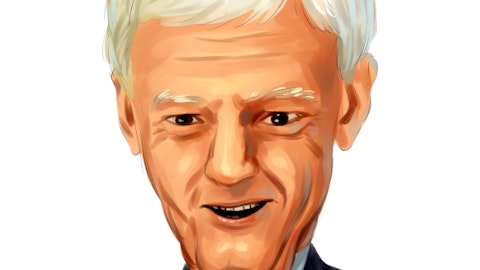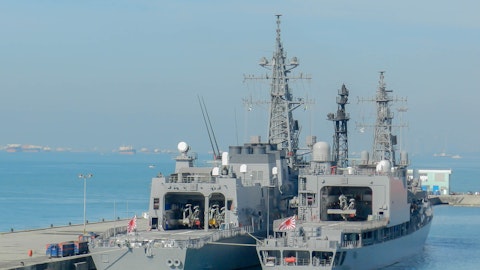Noah Poponak: Okay. All right. Thanks.
Operator: And next, we go to the line of Myles Walton with Wolfe Research. Please go ahead.
Myles Walton: Thanks, good morning. I was hoping to circle on Aviation. In the last few quarters, there’s been more discussion of this performance as a negative variance to the profit walk. That wasn’t part of the conversation. It was clearly price offset by a little bit of volume. So is it fair to think that, that bucket of performance that you all cite has materially become nonmaterial?
Scott Donnelly: Well, I wouldn’t say non-material. I would say, Myles — and look in 2023, we had pretty significant price overinflation benefits. And I think we did talk through the course of the year that, that did help to offset some of the performance issues that were driven by these labor inefficiencies and supplier impacts and stuff like that. So I think as you look at 2024, we’re expecting improved margins. We’re absolutely expecting significantly improved revenue and therefore, operating profit in the business. But the trade you’re going to see is there’s probably still positive price over inflation, but not as big a number. But you’re going to have less performance issue to have to cover with that number because we do expect to see better efficiencies in the factories and lesser impact from the supply.
So net of all this stuff, I mean, there’s a different dynamic, I believe, in 2024. That’s how we’re going to get there than 2023. But the bottom line, you’re going to see significant revenue growth and significant operating profit, including expanding margin in 2024.
Myles Walton: Okay. And then on the restructuring program, you executed, I think, about 60% maybe was directed at Bell. Of the $75 million gross savings you talked about, how much net savings is Bell getting in ’24? And also is Bell getting most of the lower R&D benefit?
Scott Donnelly: Well, look, I mean we don’t — we’re probably not going to break that all the way down, but certainly part of why the discussion I just had with Noah around why are we seeing some better margins and holding in there on the margin rates at Bell is this is part of why we took that restructuring action to control cost and manage our way as we reduce the volume in some of these historic military production programs. And so that’s part of what’s helping to sustain a better margin rate even as we see those programs ramped out. We just have to take the cost out of the business in the areas that were largely supporting these big military production programs. So I won’t put the exact number in there, but that’s a dynamic that’s helping to improve that margin.
Myles Walton: And is R&D drop there mostly in Bell?
Scott Donnelly: It is. I mean, as you know, we don’t break that all the way out. But look, we still had, as you recall, the delay of the FLRAA program in 2023, we had more of our own costs, still sustaining and supporting that program in the earlier part of the year, obviously, as that has ramped and become a full-blown contract, that’s helping to reduce that number. The overall gross R&D, the business is still growing significantly as FLRAA ramps, but the net number in terms of the IRAD side is certainly shifted from that IRAD into the contract over.
Myles Walton: Makes sense. Thank you.
Operator: And the next question we have is from Kristine Liwag with Morgan Stanley. Please go ahead. She has disconnected. We will move on to the next line of Robert Stallard with Vertical Research. Please go ahead.
Robert Stallard: Thanks so much. Good morning.
Scott Donnelly: Hi, Robert.
Robert Stallard: Scott, I’d just like to follow up on Noah’s question about the supply chain and the parts behind at the moment. Are any specific areas where you’re seeing any problems like interiors that are holding things up?
Scott Donnelly: Nothing that I would comment on a call. There’s — we all have our problem children, Rob.
Robert Stallard: Yeah. Understood. And then secondly, there’s been some press reports that Textron has been looking at some M&A competitions in recent months. I don’t expect you to comment on that. But I was wondering if you could maybe reiterate your priorities for capital deployment as we start 2024?
Scott Donnelly: Sure. No, we definitely would not comment on that. And look, I think what we’ve talked about and Frank’s indication on the share count of 191 million, obviously indicates that our priority continues to be share buyback, and that makes, we think, at this point, a pretty significant benefit for our shareholders, and that’s what we expect to continue to do in 2024.
Robert Stallard: Okay. That’s great. Thanks, Scott.
Operator: And our next question is from Seth Seifman with JPMorgan. Please go ahead.
Seth Seifman: Hey, thanks very much and good morning, everyone. I guess just asking about the performance at Aviation and kind of the improvement in productivity and parts availability that you started to see in the fourth quarter. Does that mean that in the first quarter, we can expect to see kind of a nice increase in deliveries and something that would kind of affirm the notion of being on track for the revenue guide for the year?





